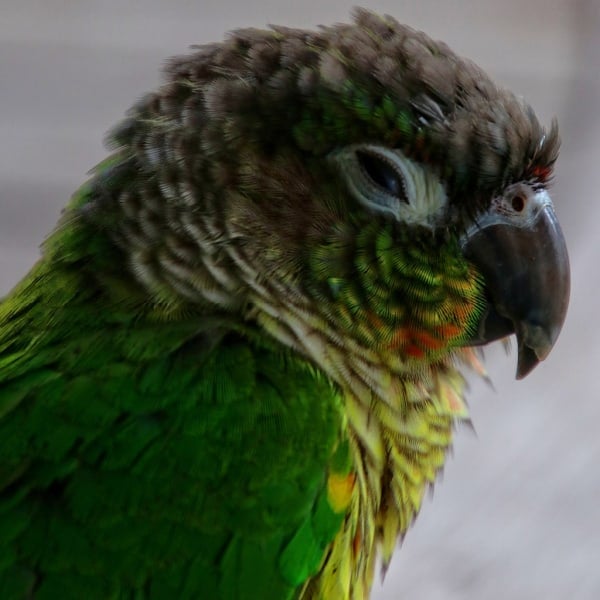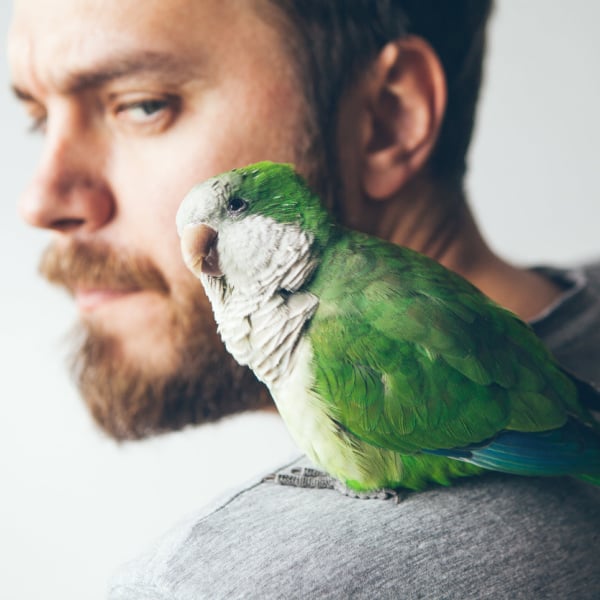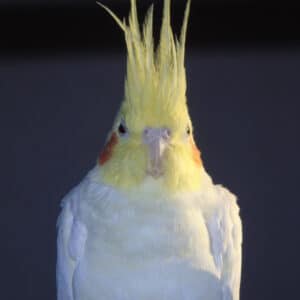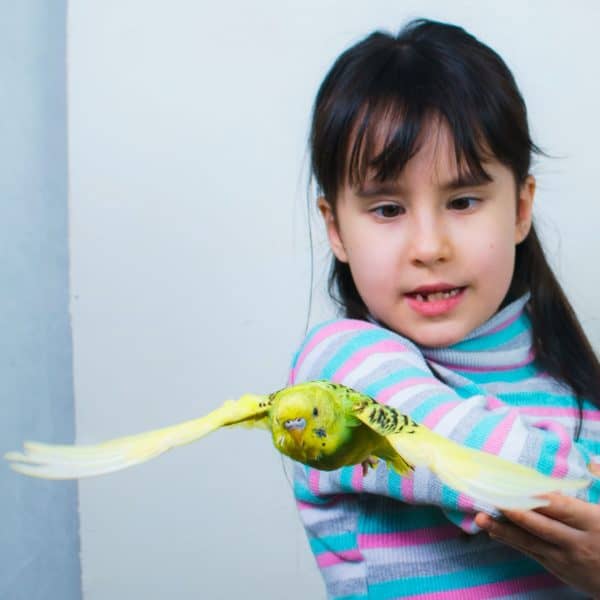Last Updated on by Mitch Rezman
Lori P writes:
I have a 1.5-year-old Green Cheek Conure.
We had bonded rather well until recently.
I have health issues and had gone several weeks without giving her much attention.
I didn’t think it would be a problem.
She didn’t act any differently.
I was sick and I would pull her cage out into the living area every morning and open her cage, prop a perch up so she could get out, etc every day.
When evening came, I would take her back to her room and tell her I was sorry and maybe tomorrow.
Tomorrow came, I was still down and this whole thing continued.
If I did manage to get her out, I would just drop down and let her jump up on my shoulder and tote her around with me, and when I needed to, drop down and let her back in her birdcage.
Recently, once things had settled for me, I dropped down and let her stir around the house with me as I did before.
Something startled her and she bit a chunk out of my right index finger.
Blood dripping.
I’m not sure how I came off to her, but as I’ve learned ( a bit too late) not to come off as being injured.
I’m sure I did and I know I had to put her back in her birdcage to handle the wound.
The next day, I let her out the same way (another lesson learned too late in not letting her step up instead) we cruised thru the house doing what we do, I sat on the sofa with her, and out of the clear blue, she leaned over, from my shoulder and bit me square on the left cheek of my face.
That time, it was completely unexpected since she kisses and cuddles and had NEVER EVER bitten me in the face, mouth, ever.
I was shocked and hurt, and I think I swatted her off my face.
Put her in her cage to fix my newest wound.
The next day, same thing, only this time, the opposite side of my face, close to my eye.
I’m not gonna lie, I’m fearful of her as much as I love her.
I loved the bond we had.
She was my best buddy before all of this and I’m as heartbroken as I’m sure she is.
I’ve read numerous articles, nothing that’s been suggested is working.
She tries to bite me thru the cage now even when I try to bring her to the living room every day.
I’ve tried gloves to protect my hands, I’ve tried bird treats, I’ve tried talking in a low tone.
She’s afraid of the gloves.
She’ll eat the treat, but also try to bite my fingers.
She’ll jump up on my shoulder and that’s where she wants to be, but I can’t allow her to bite my face.
She seems confused and scared and none of this is what I want.
I want her to be happy.
I’m well now and I feel while I was down, I’ve lost her and her trust/our bond.
What advice can you give me?
I’m desperate here to make this right.
I don’t want to lose her by relinquishing her to someone else.
I also can’t allow her to be a caged bird because I’m afraid.
She has no problems coming to me when I beckon her to come.
It’s just when I try to get her to step up, she’s drawing blood every time.
Is this a 2 fold problem?
Feelings of abandonment as well as fear of me from swatting her off my face?
It wasn’t an actual swat as it was a push off.
I’ve never hit her.
She won’t let me cuddle her….nothing!
Then when I take her to her room at night and cover her, I hear her weeping (I think that’s what it is).
We’re both torn and in need of advice.
Please help me!!!
BTW I found you from this page “Why Is My Bird Suddenly Biting?” during a Google search.
12/05/2018
Dear Lori
I am sorry to hear of the problems with your green cheek conure and you.
Reading this story I can offer my thoughts on what is happening.
Your pet has been basically left alone for a considerable time when prior it had been enjoying more quality company on a regular basis.
Editors note: Birds have very long memories.
You likely have a very disturbed and angry conure by now.
Isolation is never a good thing for any living being that is used to being a social one.
You have lost your birds trust and faith and you need to earn it back.
Lashing out is not unusual in these situations.
By the way, putting the bird right back into the cage after it bites you does nothing to help your relationship.
Go ahead, let it stay on the perch, just give it space, no treat/rewards.
Ensure it’s back on the usual socializing schedule.
You mention that you pull out the cage into the mutual living space when you want it to be with you.
If you are to do this I suspect the cage is not very large.
If it is not at least 22-24 inches wide, it is too small.
If you are leaving the bird locked up on its own for extended periods of time, it is MUCH too small.
That the bird lives in a room away from the main living space that you and or family members will use on a daily basis is also not good.
The bird should be living in a birdcage in the main area of your home.
It needs to be a part of the family, not left in another room until you have a few minutes to bring it out.
We recently adopted an older African Ringneck parrot that may have been abused. He will bite when on our bare skin so he is not allowed there yet.
Unlike a young, tame, hand fed bird, he comes with his own set of habits and rules.
We have learned to work around them in order to have Keto join our family.
[videopress G6NdBDaS]
Although he will sit in his cage and play alone, it is obvious that he would like to be out of it as well.
So we open the door in the morning and let him travel from his cage to the budgie cage where he likes to watch them.
[videopress SqnAGbFX]
Keto will also fly to a stand in our bedroom where he likes to sit and look at himself in a mirror.
He will wait for Mitch to get up in the morning.
He “commutes” between his cage, the budgie aviary, and our room until Mitch leaves for work or goes to lockdown where he will nap, eat, talk and play.
He is very attached to his bell toys in his cage and is thrilled if I remove one of them and lead him to sit on a blanket on my lap that protects my skin and let me jingle the bells for him with my hands out of reach.
[videopress yv2msxtb]
He will squeal and talk all the while the bell toy is being held by me and loves to hear me speak to him in a high voice.
But I can’t touch him.
I have learned his boundaries and working within them keeps him from biting.
This approach gives us quality time without any bad events.
Don’t put yourself into a position to be bit.
It is best to not allow the bird to sit on your shoulder at all for the time being.
Shoulders are not a right, they are an earned privilege.
Make sure you have designated places for him to sit on, play or fly to that are his that he can feel fully safe.
To move him around make sure to use a perch.
If he is not perch trained, now is the time to start.
Clicker training would be a very good thing to consider as you need to create positive reinforcement opportunities that will outweigh the negative ones.
[videopress jKChOVjY]
Over time your bird will be more interested in the good things and abandon the negative ones.
Get into a routine, a regular schedule.
Birds can tell time, just not what day it is.
If they know that you will be letting them out at a particular time of day, they are more likely to be patient instead of calling out over and over.
Less aggression will build up.
Our bird won’t act out if he does not get let out to be played with every day, but you can see that he was expecting it and he may shake his toy in a way that lets us know that we should be doing this for him.
Only time can heal your conure’s hurt at being left alone and you can make this better. Just not overnight.
Please get back to me on any of this, I hope you get your special birdie back into your life.
This article on birds and lighting may help as well.
written by catherine tobsing
approved by mitch rezman
Author Profile
Latest entries
 The Traveling BirdJune 26, 2025Can You Name 5 Parrot Species That Are Living Wild in the USA?
The Traveling BirdJune 26, 2025Can You Name 5 Parrot Species That Are Living Wild in the USA?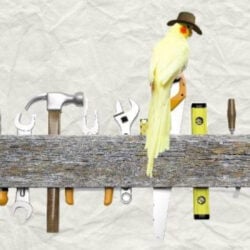 Bird BehaviorJune 26, 2025How is it Parrots Are Problem Solvers Social Animals and Even Use Tools?
Bird BehaviorJune 26, 2025How is it Parrots Are Problem Solvers Social Animals and Even Use Tools?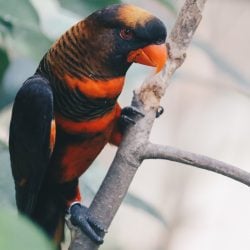 Bird & Parrot AnatomyJune 25, 2025How a Tiny Chemical Modification Makes Parrots Nature’s Living Paintings
Bird & Parrot AnatomyJune 25, 2025How a Tiny Chemical Modification Makes Parrots Nature’s Living Paintings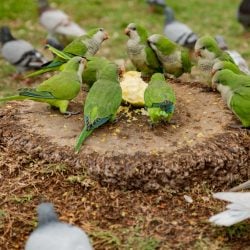 PigeonsJune 20, 2025How Do Parrots Thrive in Cities Outside Their Native Habitats?
PigeonsJune 20, 2025How Do Parrots Thrive in Cities Outside Their Native Habitats?
